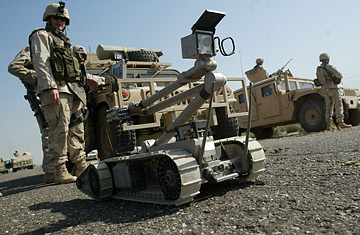
A U.S. Army team uses a robot to secure the a strip of road near Baqouba where a homemade explosive was found.
With military recruitment a constant struggle, the U.S. Army is coming up with a new way to come up with bodies: it is going to build them. This week, the Army begins a "drive-off" to see what contractor is going to provide up to 1,000 bomb-clearing robots by year's end, with a possible follow-up order for 2,000 more. The requirement is for a remote-controlled, wireless robot that weighs 50 pounds or less "to be used for Improvised Explosive Device (IED) detection and identification," according to the Pentagon's solicitation.
IEDs have killed 48.5% of the 3,270 U.S. troops killed in action in Iraq. Finding — and disarming — such roadside bombs before they detonate is one way to curb such bloodshed. "You send out a robot to interrogate these things to see if it is, in fact, a roadside bomb or if it's just trash," Army Colonel John Castles of the 82nd Airborne's 2nd Brigade Combat Team said from Iraq last week. "They're a huge benefit to what we're trying to do."
This is an "urgent" requirement, the military notes, and so there won't be any of those lengthy development phases common to military hardware. In fact, the Army wants the first pair of robots delivered within 10 days of the contract award, expected to happen Sept. 14. This week, several contenders are putting their machines through the paces, running them over and around rocks, through rough terrain and water, and ensuring that the robots can peer into, and under, vehicles — and then let its human operator know what it has found.
The need is so pressing that the Pentagon is eliminating many of the hoops suppliers usually have to jump through. This time around, instead of filling in forms and submitting paperwork to qualify as a bidder, those interested in participating merely have to register at this week's competition to qualify. Among the front-runners is iRobot, the same Massachusetts-based company that makes the Roomba vacuum cleaner.
Robots are playing an ever-increasing role in the war. iRobot, for example, has about 1,000 of its PackBots, ranging in price from $80,000 to $150,000, in Iraq scoping out IEDs, buildings and other places too dangerous for flesh-and-blood troops. Other companies have robotic Iraq veterans too. In Defense News, Kris Osborne reports that Exponent, a California firm, has had its MARCbot series since April 2004. They cost about $10,000 apiece, weigh 25 lbs and can be used at night. Meanwhile, Defense News says that Foster-Miller, a Massachussets company, may propose a lighter-weight version of its current 115 to 140 lb. TALON model to try to win the bid.
Nevertheless, like troops, robots can be wounded — and even damaged beyond repair. Some end up at Baghdad's Camp Victory, at the Joint Robotics Repair Facility. "A lot of times, they send this guy down and the insurgents are waiting," says one of the guys who fixes them. "They shoot at it because they know it is effective." But robots, thankfully, have no next of kin.
